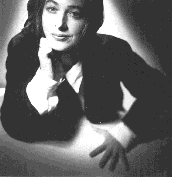Time Off - Max Sharam
![]() Thanks to Time Off
Magazine for permission to reprint this article, which appeared on
December 13th 1995
Thanks to Time Off
Magazine for permission to reprint this article, which appeared on
December 13th 1995

Max Sharam - 50 ft. drama queenie
"It's been fantastic, really full-on, but great," says a sleepy but exultant Max Sharam about her current tour. She's only just made it out of bed. "I'm still in gig mode," she says. "You stay up until three or four in the morning post-gig and you end up sleeping in until one o'clock and my body clock hasn't changed back."
For a performer as theatrical and dramatic as Max Sharam, live performance gives her the opportunity to explore more fully the fantastical elements of her craft. "It means you can put everything in, you can interpret the songs, within a budget of course," she says. "I like to think of each song as a story that has an accompanying mood and visual. And I think I'm a better live performer; recording an album can have a lot to do with studio experience and you can capture a lot more live than you can on your first album."
Indeed, given the very visual and moody nature of her music, Sharam insists that she actually felt more limited in the studio than she does on the stage. "It was very overwhelming," she says of the experience recording her debut A Million Year Girl. "When I was 19 I'd recorded, strangely enough, in Italy - I'd done a rock opera and we recorded the soundtrack album and I'd done a few demo songs for people who wanted me to sing these songs in the studio," she tells. "It was effortless at the time because there was nothing precious about it to me. Everyone was amazed at how I could go in and do it in one or two takes. But this [A Million Year Girl] was a much greater, more personal and precious project, so that sort of changes things a lot."
What does the title A Million Year Girl refer to?
"Well, it was a few things. I guess it related to 'Coma', initially, because of the time factor of being in a coma - I wanted to bring in the element of fantasy, like the Sleeping Beauty, someone comatose forever, and Rumplestiltskin, another fairytale of someone who slept for a million years and when he woke up everything had changed. It was also about the timeless nature of life, as opposed to money, because when people hear the word 'Million' they always associate it to money, not time and longevity..."
How much of the album is fantasy and how much is reality?
"I don't know if I could put it into percentages," Sharam laughs, and then promptly obliges. "I love to be taken away into another world, since an early age I've always managed to live in my own world, so for the average person perhaps 90 percent of it's fantasy. But for me I guess it's about 60 or 70 percent fabrication, and the fabrication comes from being idealistic and how you perceive things or putting yourself in somebody else's shoes or in another time and imagining what it would be like."
What did you learn from the making of the album?
"I learnt that... oh man, I learnt a million things," she laughs. "I learned how incredibly rigid some people's perceptions can be of women and their music in the studio, because it was quite difficult for me to 'Bring the Girl Out', which was part of the fantasy too - to make something particularly feminine, for the little girl mentality, rather than trying to be something that's cool and sexy and more or less play up to the male market.
"I wanted to particularly design it for the young and the sensitive and that was a bit hard because, one, I don't think many people had ever attempted to do that, and two, succeeded in doing that. So I had confrontation in the studio where the boys would say, 'Oh, that's naff, you can't do that, that's too girly', or something like that."
Do you think, after the success of this album, you've got more clout to achieve what you want next time?
"Yeah. I think I won't allow my vision to be... influenced by my surrounds in the future. I had a vision that I wanted to bring to life [but] I think it wasn't allowed much flexibility by the producers. Musically they did an absolutely above average job in the engineering and the production, but it was a struggle in regards to keeping the vision there. I think next time I will have a much much calmer and stronger approach."
You spoke about wanting to make something that was particularly feminine, but is it possible to make something that's innately feminine? Are men and women really that different?
"Oh, I think we're very, very different, but at the same time we're like the two hands clapping. It just felt natural for me, that was where I was at for the first album, it was extremely indicative of the times in that there was a real need for female music - female music, as opposed to women doing male music. It's definitely changed, and I said when we were recording that this was going to be a time for women in the music industry. It was like the pendulum had to swing."
What are you trying to achieve?
"Oh, self-satisfaction," she says as though it were the most obvious thing in the world. "Living my dreams and fantasies. Expressing myself, ultimately - if I didn't do what I do I think I probably would have shrivelled up and died a long time ago."
Max Sharam plays a show at the Suncorp Piazza on Saturday (the 16th).
ANDREW STAFFORD
(C) Copyright 1995 Time Off Publications.